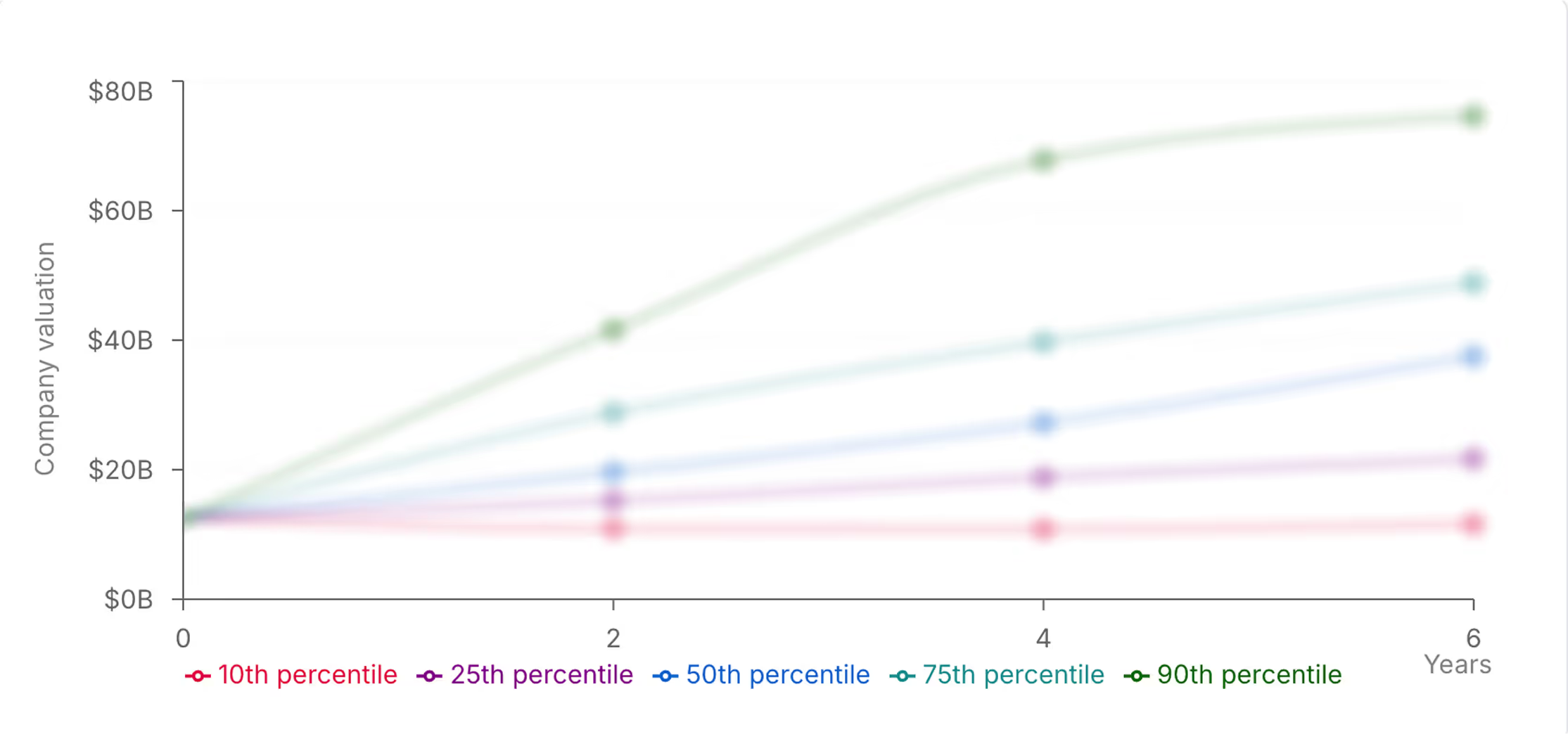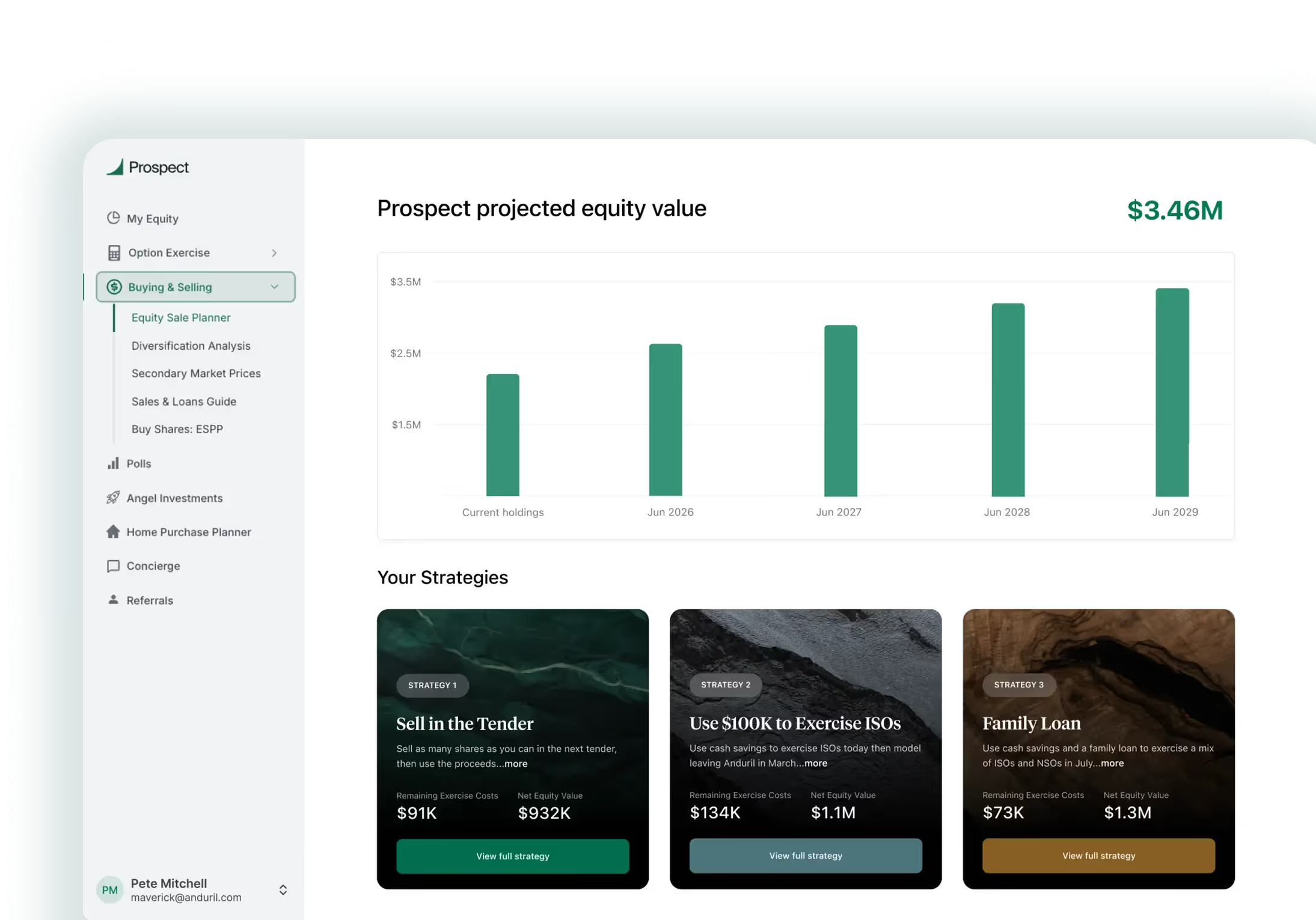
Sword Health
Sword Health provides virtual physical therapy with its FDA-listed, AI-powered Digital Therapist, delivering personalized care to treat musculoskeletal pain.
Secondary Market Price
How Sword Health Measure's Up
To help you manage your Sword Health equity, Prospect has run the company through our machine learning model.
Prospect Rating
Our 2x rating for Sword Health projects that the company will be worth at least double its current $3 billion valuation in four years. For an employee, this suggests that any stock compensation you receive could also double in value over that same period.
Exit Risk
We gave Sword Health a 'Low Risk' rating because it is backed by top investors, which in our view, lowers the likelihood that the company will fail to reach a liquidity event for its employees when compared to other startups.
Funding Stage
Series E
As a Series E company, Sword Health is well-established and has moved beyond the initial high-risk startup phase. For you, this often means greater job stability and more defined roles compared to an earlier-stage business.
Secondary Market Price Chart
Secondary market prices shown here are a limited preview. Create a free account to access real-time secondary market prices.
Sign up to Unlock the Latest DataData will be available soon.
Sign up to receive notifications when it is available.

Prospect Projected Future Sword Health Prices
Prospect’s machine learning model has been trained on the same data top-tier investors use to project the likely range of outcomes for Sword Health's equity. Create a free account to view 10th-90th percentile projections over 2, 4, and 6 years.

Powerful tools to earn more from your equity

Company Description
Sword Health is a digital healthcare company pioneering what it calls "AI Care" to predict, prevent, and treat physical pain. The company provides virtual physical therapy for musculoskeletal (MSK) conditions by combining its AI-powered platform with the supervision of licensed clinicians. Its core technology includes an FDA-listed Digital Therapist device with motion sensors that guides users through exercises at home. Founded in 2014 by Virgílio Bento, who has a background in neuroscience, the company was created to make high-quality MSK care more accessible and affordable. Beyond general MSK therapy, Sword has expanded its offerings to include specialized solutions like Bloom for pelvic health and Sword Predict, an AI engine designed to help patients avoid unnecessary surgeries.
The company is focused on strategic growth, recently partnering with Alight Solutions to bring its programs to more employers and acquiring the UK-based company Surgery Hero to broaden its capabilities. Sword Health has also been active in policy, successfully advocating for legislation in Illinois to make virtual physical therapy more accessible. This forward momentum is part of a larger strategy to expand into new areas like women's health, grow its market share across the U.S., Canada, Europe, and Australia, and pursue further acquisitions. These efforts align with its stated mission to alleviate pain for two billion people worldwide.
- Sequoia Capital
- GV
- Goldman Sachs
- Temasek
- Fidelity
- SV Angel
- Baillie Gifford
- TPG
- CrunchFund
- Aydin Senkut
- Oakhouse Partners
- Toyota Tsusho
- Katalyst Ventures
- Chris Dixon
- Bright Success
- Design to Improve Life
- Visionnaire Ventures
- Co-Founder, CEO Virgílio Bento
- Co-Founder, CSO Márcio Colunas
Frequently Asked Questions
Joining Anduril as an employee is another way to acquire equity, typically through stock options included in compensation packages.
Is Sword Health worth joining?
With a $3 billion valuation and backing from top-tier investors, Sword Health shows strong signs of growth in the massive musculoskeletal care market. To make a fully informed decision, you can use a platform like Prospect to analyze the company's trajectory and what your specific equity offer might be worth.
What should I do with my Sword Health stock?
As an employee of a private company, your primary options are to hold your shares until a liquidity event like an IPO or explore selling on secondary markets if permitted. Tools from Prospect can help you manage your equity by providing tax optimization strategies and modeling scenarios for future financial outcomes.
Can you sell Sword Health stock?
Since Sword Health is a private company, its stock isn't publicly traded, but employees may be able to sell shares on secondary markets, subject to company policies. Platforms like Prospect can help you navigate this process by providing data on secondary market prices and strategies for tax-optimal sales.
How can I find the value of my Sword Health stock?
The value of private company stock is based on factors like the most recent 409A valuation and the price set during funding rounds, which placed Sword Health's valuation at $3 billion. For a personalized estimate, services like Prospect use comprehensive data to project your equity's potential worth.
What is Sword Health's equity worth?
The company as a whole has a latest valuation of $3 billion, which provides a benchmark for its equity's value. The worth of your specific equity grant depends on its size and the company's performance, which you can model using tools from platforms like Prospect.
What is Sword Health's stock ticker symbol?
Sword Health does not have a stock ticker symbol because it is a private company. Ticker symbols are only assigned to companies whose shares are listed and traded on public stock exchanges.
Can I buy or sell Sword Health stock?
As Sword Health is a private company, its stock is not available for purchase by the general public on any stock exchange. Existing stockholders may be able to sell their shares on secondary markets, a process that platforms like Prospect can help you navigate with data and tax strategies.
What is the criteria to buy or invest in Sword Health stock?
Investment in private companies like Sword Health is typically limited to institutional investors and accredited investors who participate in organized funding rounds. The general public usually cannot invest until the company pursues an Initial Public Offering (IPO).


